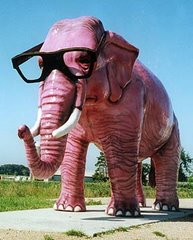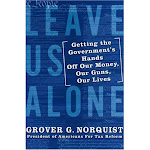My answer at the time was to say I find myself becoming less conservative and more libertarian. I then went on to reassure him that I do not approve of the current dominance of the Theocrats in the GOP. Both points are certainly still true, but I thought I would elaborate a little more on the topic.
 I will NOT be an apologist for the Republican Party in its current form. I have a lot to criticize both on social and economic issues. However, as I have alluded to before, for most of my political life I have focused almost exclusively on economic issues. I am a free marketer almost to the point of fanaticism. I occasionally described my political orientation as "capitalist" to imply that I was indifferent to social issues. I joined the Republicans for their focuses on low taxes, limited spending, deregulation and free trade (I miss that Republican Party; where did it go?). I accepted the social conservatism of the party as basically the transaction cost of my economic agenda. My focus on economic issues, I admit, was at least in part due to my repression of my sexuality.
I will NOT be an apologist for the Republican Party in its current form. I have a lot to criticize both on social and economic issues. However, as I have alluded to before, for most of my political life I have focused almost exclusively on economic issues. I am a free marketer almost to the point of fanaticism. I occasionally described my political orientation as "capitalist" to imply that I was indifferent to social issues. I joined the Republicans for their focuses on low taxes, limited spending, deregulation and free trade (I miss that Republican Party; where did it go?). I accepted the social conservatism of the party as basically the transaction cost of my economic agenda. My focus on economic issues, I admit, was at least in part due to my repression of my sexuality.As I started the process of coming out, I realized that I could no longer ignore social issues. In fact I was ashamed that I had ignored them for so long. Being gay, although it certainly informs my positions on social issues, does not change my economic positions. I am still the same anti-tax, low-spending, deregulatory free trader I always was. For the first time, I started seeking alternatives to the statist-theocrat dichotomy. I found my solution among libertarians.
Libertarians were once a sizable subsection of Republicans, but as the Theocrats got louder they pushed the libertarians out of the GOP. By the time I had come to the libertarians very few of them would self-identify as Republicans. I had to decide whether to join the libertarian tide and leave the Republican party, or to stay and try to fight the theocratic homogeneity (I bet they hate that word simply because of the first two syllables).
 I decided to stay and fight. We are in a two party political system and moving to third party almost assures you of being politically irrelevant and unhappy with all outcomes. But more importantly, if we (gays and/or libertarians) leave the GOP because of the obnoxious Theocrats, then the Theocrats become even more dominant in the party. The Republican Party is not going to change from the outside, and it DOES need to change from somewhere.
I decided to stay and fight. We are in a two party political system and moving to third party almost assures you of being politically irrelevant and unhappy with all outcomes. But more importantly, if we (gays and/or libertarians) leave the GOP because of the obnoxious Theocrats, then the Theocrats become even more dominant in the party. The Republican Party is not going to change from the outside, and it DOES need to change from somewhere.I am certainly a young, probably naive, idealist, reformer-type. Even if chances of success are very slim it's worth it trying. We can succeed without trying, and the current state of affairs won't do at all. Who knows, maybe (hopefully) in a generation being gay will have no more political meaning to the Republicans than being a woman does.



10 comments:
What exactly does staying in and fighting the theocrats mean? Will you still vote Republican? Will you still support their candidates? If so, they're never going to learn their lesson. They don't respond to reasoned arguments that libertarianism is better. They respond to votes. In that case, I'd imagine that building up a libertarian party for the disaffected Republicans would do more to reduce the strangle-hold of the theocrats. No?
Also, why do you have such a strong commitment to conservative economics? Where did that come from? And why does it merit such enthusiasm?
Is it a philosophical matter? Do you think it'll make you richer, personally? Do you think it's better for America? (And if so, which America? The poor or the rich?)
I am definitely not attacking. I'm just curious. I've never understood why people get all worked up about economic issues. Especially when the "transaction cost" is offensive (and personally damaging) theocratic social policy.
Your question is a very good one.
It means supporting candidates in both primary and general elections (for example, Rep. Ron Paul) that take libertarian positions on social issues. It means having conversations with other voters. It means donating money and time to the log cabins and other groups that advance a tolerant agenda. Indeed it means abstaining in some elections, as I did in 2006.
But my focus is less on candidates than on other voters. Certainly, you are right that candidates do not respond to anything but votes, but I think voters do. I've done work on some grassroots campaigns (not for candidates, but for certain ballot initiatives) and found that most were at least willing to listen. However, it's important to establish a common ground ("I'm a Republican too, but it seems to me that...").
My focus is also more local, because I have found grassroots easier at the local and state level. Also, it's state level policies that affect us most--some states allow gay couples to adopt more easily than others, for example.
As for national candidates, I don't think I can bring myself to vote for Obama, and I know I couldn't vote for Hills. I have decided, however, that I will not for the sake of the party support a Republican candidate who is hostile to gays. My days doing that are over, and I regret them immensely.
Your second question is also a good one, short answer: it's very largely philosophical. I've been heavily influenced by several books: Milton Friedman's CAPITALISM AND FREEDOM, Friedrich Hayek's THE ROAD TO SERFDOM, and Ayn Rand's ATLAS SHRUGGED (though I am not NOT a Randian "Objectivist"). Also, I just happen to find economics interesting generally, bizarre as that is. This may be a topic of a future post.
Yeah... I'll just say I understand much of what you mean. For me it's more religion that politics.
I'm a democrat... and disagree with many of the particulars of the party nowadays, their constant wishy washiness to get whatever votes they can, their portraying themselves as imply opposed to Republicans instead of having their own views they want to stand up for... but in general... I believe in a big central government that needs to take role in ensuring that the needs of all people are met, not just those of the most powerful that get their power by taking it from the vulnerable.
We would disagree on most everything politically... but I understand your view and it's equally valid, just not one I choose for myself.
But for religion... I have the same issues as you do with the Republican party. I'm Catholic, a theology major in college as well. The Church that I believe in has been taken over by the ultraconservative side that concentrates on a God of hatred and justice instead of the one of love and kindness I believe in.
However... to leave it solves no problems. I can go join the freer religions that don't have the influence... but nothing will change. It's important to stay a part of the Church I believe in and do my part to try and bring it back to what it should be.
Ironically we're fighting the same theocrats... just in different arenas.
But yeah... you start small... find people of like minds who see the same problems you do and build from there. It's laborious... but rewarding work.
I may never agree with your political stances, but best of luck getting rid of the theocrats... because that will be a definite improvement, something I think both sides would like to see. A world where religion can remain separate from politics would be nice.
Jason,
Thanks for stopping by! Even though we probably disagree on much politically, our shared distaste for the Theocrats makes us unlikely allies. I hope you will continue to read and you'll comment when you disagree with what I say.
Hey!
I have a question: when you use the term Theocrat, what does that mean to you? It's all but impossible to refrain from using shorthand words or phrases to refer to a group when blogging--I'm not questioning that. . .just wondering what you mean by "Theocrat" when it's used on your blog, so I can better understand exactly who you're referring to.
Theocrat: the type of social conservative that believes it is a proper function of government to enforce upon all citizens their own idea of morality, in particular regards to sexual morality and other types of victimless "sins."
Gotcha. Thanks!
Another question, just for s'cuz: where does the Pink Elephant stand on polygamy? I hear some say that this is a "victimless" crime, but i would argue otherwise.
Note: I am NOT comparing homesexuality/gay marriage to polygamy. It's actually one of my pet peeves that anyone does.
I don't have a problem with polygamy, but I'm hoping to hear why you do.
Post a Comment